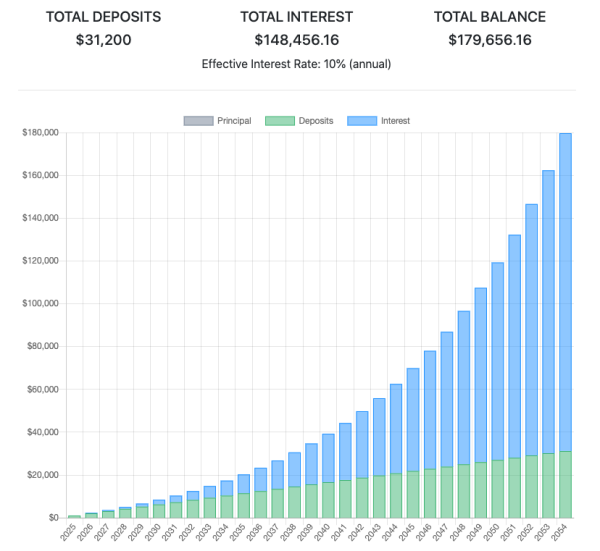In an age of instant gratification, we are drawn to the illusion of quick fixes, often framed by a parade of success stories — whether on stage at motivational seminars or, more commonly, scrolling through social media. These narratives promise effortless fulfillment, yet they are ultimately a gamble. True stability and resilience come not from fleeting trends but from rising above them, seeking what is authentic and enduring. This path requires an uncommon commitment to self-awareness and introspection — questioning our beliefs and thoughtfully considering our actions.
. . .
I was thinking today, for some reason, about the lottery — more specifically, how much someone like my late father might have spent on it over the 30 or so years I knew him to buy tickets. Some weeks, he likely spent more, as the prizes and jackpots were larger than average. Other weeks, it was simply about making sure to buy in; after all, if those numbers ever came up and you hadn’t played, the level of self-reproach would likely be off the scale.
That’s the trick and the psychological trap of it, regardless of the level of gambling one engages in. It might start as a simple “why not give it a try,” but then the seed is planted. The worry embeds itself in your conscious mind, bubbling just beneath the surface. If your life lacks freedom, fluidity, passion, or joy, those extremely unlikely chances of winning can start to feel disproportionately important.
What we often fail to realize is that, over the long term, any small winnings we might enjoy are entirely offset by the countless weeks of added excitement where we — and perhaps our friends, or co-workers — decided to double down… just in case. On average, $20 per week seems about right to me.
So, here’s a little bit of math to consider. I asked ChatGPT the following: If a person spends $20 per week on average on lottery tickets and over 30 years they occasionally win say a couple hundred maybe even a couple of thousand dollars but we know the odds are extremely low, if they had instead invested all of that money into even a very low interest savings account say at 5% which compounded annually, how much would they have in savings if they hadn’t purchased lottery tickets.
The response: If the person had saved and invested $20 per week into a savings account with a 5% annual interest rate compounded annually, instead of spending it on lottery tickets, they would have approximately $72,551.22 after 30 years.
And if it was 10%? At a 10% annual interest rate, the savings would grow to approximately $188,181.16.
Remember, this is based on only $20 per week, every week, over 30 years. Perhaps it’s a useful way to reframe all the things we’ve senselessly, impulsively, or wastefully spent money on over the years. We’re all guilty of it in one way or another, driven by our desire to feel good, to feel happy, and to satisfy our need for dopamine hits. Our misplaced sense of deserving often outweighs our discipline and better judgment.
Mixed into this are fears of missing out, coping with stress, chronic pain, or the quiet desperation that underpins so many acts of self-sabotage — especially when it comes to money and finances.
Compound interest is truly remarkable, particularly in the final months or years of an investment’s term.
Here’s a visual representation, starting with $0 principal investment, courtesy of this calculator:
Many of us have explored various side hustles or entrepreneurial experiments, often driven by the hope of creating something that allows us to escape the day-job system. I’ve dabbled in my share of “network marketing” and similar ventures over the years. The best parts of these experiences were the books, research, learning, and friendships that emerged along the way. The worst part was the eventual realization that most of these efforts were never going to amount to much or be sustainable in the long run. From the start, they often felt forced, requiring us to continually push ourselves to stay motivated while juggling the other demands of life.
We may become deeply passionate — almost religious — about our affiliations and group efforts, but these frameworks are often built on flawed logic and subtle, yet corrosive, inauthentic business practices. Shining examples of those who’ve achieved remarkable success are repeatedly paraded before us. Yet, in reality, these success stories often rely on psychological manipulation, with confirmation biases making widespread success seem far more achievable than it truly is.
There’s a psychology to money and wealth, and most of us are trained in ways that run counter to what would genuinely serve us or align with how things work in reality. A hierarchical process underpins much of it, and very few people manage to rise above it in their lifetime — particularly if they’ve been shaped by the same programming and conditioning that have perpetuated across generations. At the root of this is belief, essentially a series of repeated thoughts. These thoughts are ingrained in us by our environment and circumstances, hardwired from a young age and making them incredibly difficult to overcome, no matter how much effort we invest in doing so.
Life has an uncanny way of affirming our perspectives and reinforcing our perceptions. Regardless of how much effort we pour into new ventures or side hustles, our default programming is always there — ready to overpower what is new and unfamiliar with what is comfortable, safe, and expected.
In an era of instant gratification, we crave quick fixes. Social media is right there, parading alleged success stories based on our searches, discussions, and text messages. We tend to think it’s something intuitive or otherworldly, but it’s really just machine learning at work. There’s no “artificial intelligence” here. Instead, there are tools — based on human ingenuity and creativity — that mimic and adapt, utilizing all of recorded human history to assist us in various ways.
Not surprisingly, today we have “AI-Assisted Business” motifs proliferating through the zeitgeist, yet another attempt at a quick fix, belying the fact that many of the very jobs we currently rely on may soon be made extinct by this same technology. Excitement is easy, but slow, steady, methodical, and disciplined effort is not. This challenge is compounded if we’ve tasted the sweet life or had periods of abundance and freedom that offer a glimpse at what could (or we believe should) be. Rather than instilling temperance, these experiences often lead us to believe that success should come quickly. In reality, achieving and maintaining it requires a growth mindset, persistent effort, and clear action plans.
Long-term benefits come with small, incremental, steady, and considered practices. Any impulsive act may become a habit if we can stick with it over a few weeks or months, especially if we appreciate the greater picture and the ultimate desires we wish to realize. It requires, first and foremost, an honest view of who and what we are, where we are, what is real, tangible, and practical, and what we truly and authentically value and want out of this short life. To pivot and adjust our course, it helps to have a trajectory and destination in mind. These things will change as we evolve and grow through the myriad experiences that life brings our way. The people — friends, family, mentors, and even enemies — will all play their part, only because we asked for them to come our way, consciously or not. Taking that level of responsibility is uncommon, but perhaps it is the single most critical place to begin any kind of significant life change.
Quick fixes are, quite simply, a gamble. For some, that may work as they bounce from one thing to another, never building consistency or a solid foundation. But for most of us, we’ll have to rise above the clamor and the shiny representations of falsity and fabrication. We want what is authentic, real, and true, because we want lasting stability and resilience. We want the uncommon wisdom that inherently comes along with this mindset, too. Therefore, we’ll have to engage in an uncommon process of awareness of our thoughts, interrogation of our beliefs, and consideration of our actions.
It is, indeed, solved by walking.
Solvitur ambulando
Written by Trance Blackman. Originally published on tranceblackman.com on 18 January 2025.

